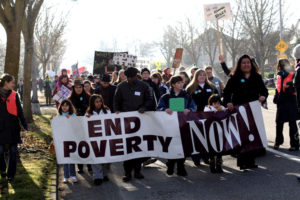
That paradox illustrates perfectly just how much elected officials are controlled by party orthodoxy than the actual needs of their constituents. It is also the subject of a new report by the Sargent Shriver National Center on Poverty Law detailing how little the current Congress is doing the alleviate the suffering of the nation’s poor.
“Too many Americans struggle to keep food on the table throughout the month, and many more, focused on stretching their incomes to meet immediate needs, lack the resources to invest in a home or plan for a secure and dignified retirement,” the Center wrote in the Poverty Scorecard 2014: Rating Members of Congress.
The report delivers a score for each member of Congress on taking action or failing to action on issues related to poverty in America. As has been revealed in the past, the states whose Congressional delegations got the lowest scores were those with the highest concentrations of poor people. As can be seen on the chart, these were the seven states with the biggest divergence between the votes of the representatives and the highest concentrations of poverty: South Carolina, Kentucky, Louisiana, Arkansas, Tennessee, Georgia and Alabama.
| State | Poverty rate | Poverty rank | Vote score | Vote rank |
|---|---|---|---|---|
| South Carolina | 18.6% | 9th | 29% | 46th |
| Kentucky | 18.8% | 6th | 36% | 42nd |
| Louisiana | 19.8% | 3rd | 42% | 36th |
| Arkansas | 19.7% | 4th | 42% | 38th |
| Tennessee | 17.8% | 12th | 37% | 40th |
| Georgia | 19% | 5th | 41% | 39th |
| Alabama | 18.7% | 7th | 31% | 45th |
“Forty-five million Americans live in poverty; millions more are only one paycheck away from joining them,” the Center wrote in the report. “Women, people of color, and young working adults disproportionately face the stress of living paycheck-to-paycheck. For women and people of color, these trends reflect histories of discrimination that current policies fail to eliminate. While quality jobs offer a path out of poverty for some, a growing percentage of work offers only low wages and a constantly shifting work schedule, with little opportunity for skill building and promotion. Increased reliance on low-wage work, in combination with increased costs of living for everything from health care to housing, pulls Americans down and shrinks the middle class.”
Since it is the plight of the middle-class that has become the recent obsession of American politics, it would seem that any phenomena that affects the lives of middle-class Americans would be centered directly in the sights of Congressional lawmakers. But that seems far from the case, judging by the analysis of the Shriver Center. Congress rejected many pieces of legislation last year that would have made the lives of people in poverty better, in addition to helping the middle class, such as equal pay laws for women, raising the minimum wage, extending unemployment benefits, protecting workers from wage theft and improving college accessibility.
| State | Poverty rate | Poverty rank | Vote score | Vote rank |
|---|---|---|---|---|
| New Mexico | 21.9% | 2nd | 84% | 10th |
| New York | 16% | 20th | 78% | 12th |
| California | 16.8% | 16th | 74% | 13th |
| West Virginia | 18.5% | 10th | 63% | 19th |
| Oregon | 16.7% | 18th | 85% | 8th |
| State | Poverty rate | Poverty rank | Vote score | Vote rank |
|---|---|---|---|---|
| Vermont | 12.3% | 39th | 98% | 2nd |
| Maryland | 10.1% | 48th | 86% | 7th |
| New Hampshire | 8.7% | 50th | 82.5% | 11th |
| Connecticut | 10.7% | 47th | 89% | 5th |
| Massachusetts | 11.9% | 40th | 90% | 4th |
| Hawaii | 10.8% | 46th | 96% | 3rd |
| Delaware | 12.4% | 38th | 100% | 1st |
In order to come up with its scores and rankings, the Shriver Center identified the most important poverty-related votes taken by Congress, with the help of national experts, and then compiled a record of how each of Senator and Representative voted.
The Center said the most significant anti-poverty accomplishment by Congress in 2014 was to enact two comprehensive pieces of legislation that provide essential support to people in poverty seeking upward mobility: the Workforce Innovation and Opportunity Act and the Child Care and Development Block Grant. But both of them are just reauthorizations of existing programs—though that shouldn’t be taken for granted in a Congress with such a seeming hostility toward the poor.
The Center said there were attempts by the Republicans in the House to advance laws that would have devastated people in poverty, such as attacks on anti-discrimination laws, key provisions of the Affordable Care Act, immigrants, and consumer protections, but they weren’t able to garner enough votes to turn them into law.


